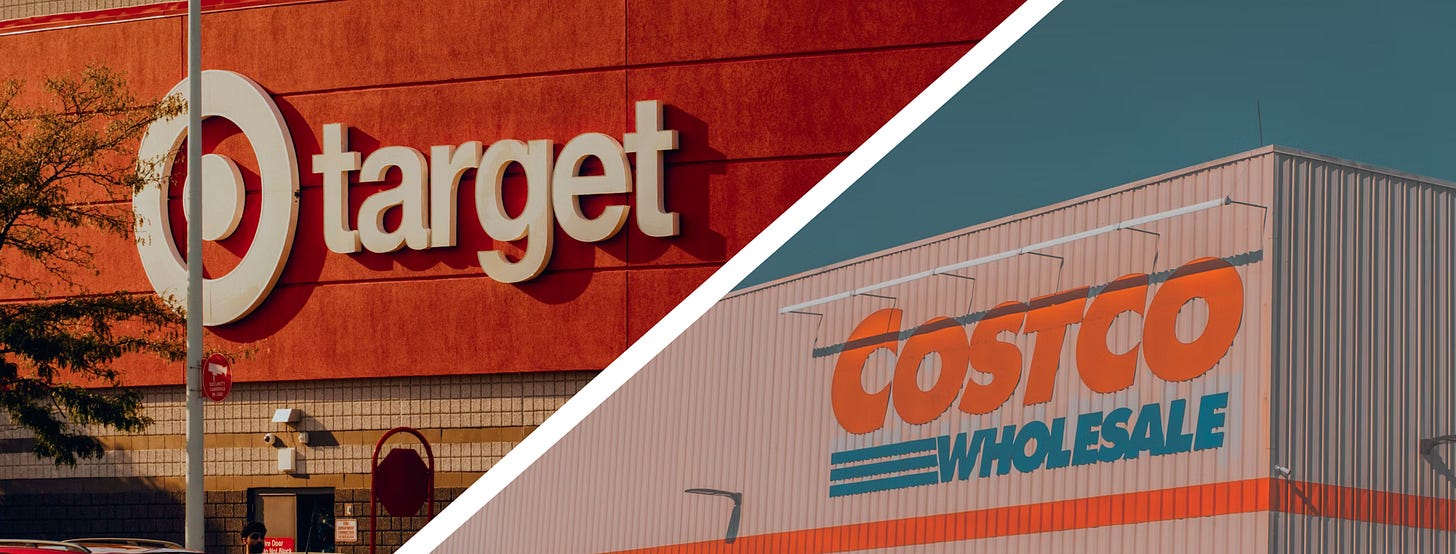Target Backtracked on DEI—Costco Doubled Down. Guess Who’s Winning?
DEI initiatives still matter, especially to consumers. Case in point: Target’s backlash vs Costco's rally.
THE SITUATION
In recent months, multiple major corporations have scaled back their diversity, equity, and inclusion efforts, ranging from tweaking language to eliminating DEI programs altogether. One company, however, has received the most public backlash: Target. The day Target announced it was rolling back its DEI initiatives, civil rights activists called for a nationwide 40-day boycott starting February 1, the first day of Black History Month. But why is there so much backlash against Target specifically?
Target had once made bold commitments to diversity and inclusion efforts in the wake of the police killing of George Floyd in Minneapolis, near Target’s headquarters. Given Target's previously outspoken stance on diversity initiatives, this pivot has led to disillusionment among some of its loyal customers and suppliers. Once a leader in DEI, Target's retreat feels more like a betrayal. Activists and consumers are demanding accountability, urging Target to honor its commitments and set a standard for other companies.
OUR ANALYSIS
So, how did Target get here? Our team at FreeCap was shocked to see Target backtrack on its commitment to diversity because they are historically a top performer in FreeCap’s dataset, receiving a score of 95/100 for the past two years. This is partially due to its equitable hiring initiatives and inclusive policies. Target has consistently published its annual EEO-1 report before it was trendy to do so, and has a history of strong support of workforce diversity.
Our team at FreeCap actively tracks Target’s corporate social responsibility initiatives. In 2020, one month after George Floyd's murder, Target announced a $10 million investment in social justice and a partnership with the National Urban League and African American Leadership Forum.
The Racial Equity Action and Change (REACH) Committee was formed to advance racial equity for Black team members and guests. The committee worked towards increasing the representation of Black team members by 20% by 2023, focusing on retention. They also committed to investing $100 million through 2025 to assist Black communities nationwide and spend more than $2 billion with Black-owned businesses.
These initiatives were scheduled to wrap up in 2025. However, that was clearly not communicated to a key stakeholder group—their customers. Target has stopped all external diversity-focused surveys, including the Human Rights Campaign’s Corporate Equality Index. The Supplier Diversity team has also been rebranded as Supplier Engagement to focus on recruiting a broader range of suppliers. No new diversity goals have been announced yet to replace the ones concluded.
Target's decision to reduce the political risk of lawsuits for its DEI work was poorly calculated. Not only does the company now face backlash and reputational risk by backing away from this work, but it’s also being sued by a politicized group of shareholders anyway for its DEI backlash. Instead of avoiding the problem, it made it worse.
To be clear, Target’s problem is not DEI. DEI is excellent for shareholders when executed as a strategy rather than reactionary. Costco is a great example of this.
Costco’s Commitment to DEI Pays Off
Unlike Target, Costco has defended its DEI efforts, even in the face of political pushback. When a think tank submitted a proposal asking Costco to end its DEI work, Costco’s board of directors stressed that “our commitment to an enterprise rooted in respect and inclusion is appropriate and necessary” and leads to “creativity and innovation in the merchandise and services that we offer,” which in turn leads to satisfied customers.
Costco’s board was rewarded for its leadership and clarity in strategy. In the end, 98% of shareholders agreed to reject the proposal. Costco’s stock price has reached an all-time high, demonstrating that companies investing in DEI are not just making a social statement—they are making a smart business decision.
THE TAKEAWAY
For investors & CSR professionals:
Greenwashing, or in this case, diversity-washing, is expensive. We will have to wait and see how the boycott will impact Target’s Q1 earnings, but the reputational damage has already been done. A formidable reputation takes a long time to build but can be torn down quickly, so managing this risk is essential. And it is not just the boycott that is costing Target money. The pending lawsuit from shareholders complaining that their DEI initiatives artificially inflated share prices, because they did not correctly factor in the risk of backlash, is also expensive.
This brings us to our next point: a reactionary approach to DEI is costly, but a proactive strategy can reap dividends. Target’s problem is not DEI, it is that they created programs in response to public sentiment rather than implementing a plan that is tied to core business fundamentals. Reactionary companies will receive backlash from consumers when they back away from their goals. But a true vision where DEI is tied to business objectives is a winning strategy. Costco knows that it needs to have a diverse, equitable, and inclusive workforce to meet its diverse consumers' shopping needs. Target also serves a diverse consumer base and would benefit from a coherent DEI strategy. Still, it must be tied to business fundamentals that can withstand the policy whims of any political administration.
Are you curious about Tanay’s personal plans regarding the Target boycott? Paid subscribers keep reading to learn more.
Keep reading with a 7-day free trial
Subscribe to FreeCap Financial's Substack to keep reading this post and get 7 days of free access to the full post archives.









